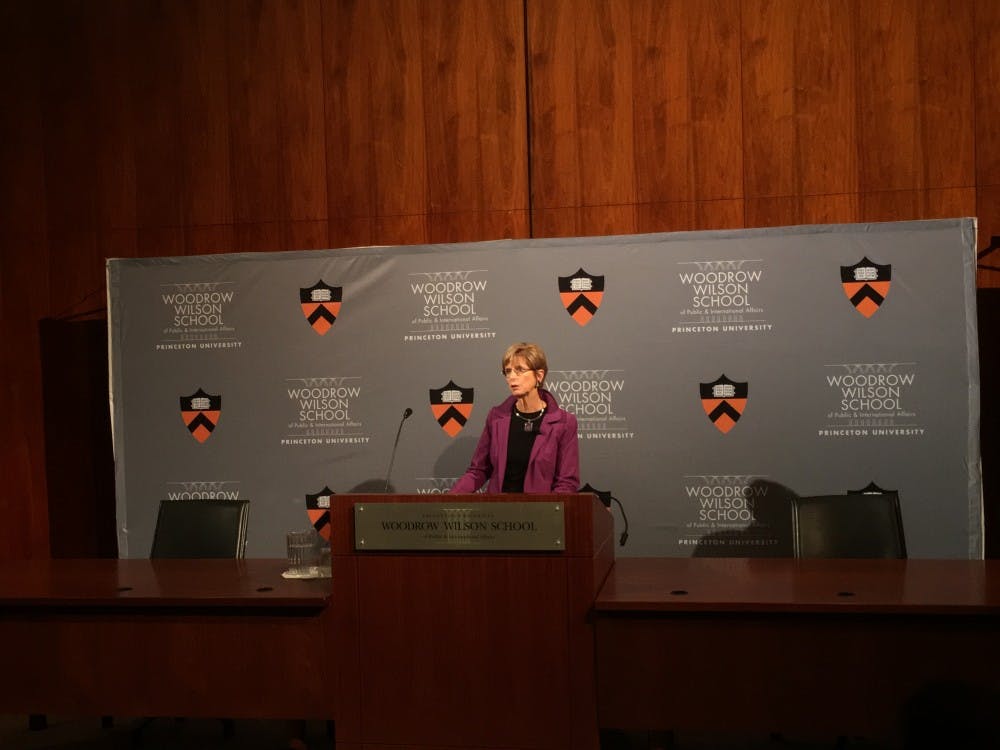Politically moderate citizens must become more involved in government in order for the current polarizing political climate to improve, according to Christine Todd Whitman, the former governor of New Jersey and administrator of the Environmental Protection Agency (EPA) from 2001 to 2003.
Whitman began by addressing the “norms” that have defined principles of American government and the Constitution throughout U.S. history. She then discussed the significance of several institutions and principles that she believes are particularly relevant in modern-day politics, such as freedom of the press, the emoluments clause of the Constitution, and the loopholes in the Code of Ethics of Government Service.
As a member of the Republican Party, Whitman served as the 50th Governor of New Jersey from 1994 to 2001 and subsequently as the ninth administrator of the EPA during the administration of former President George W. Bush. Whitman visited the Wilson School as its Judith H. Rawson and Robert Rawson Distinguished Visitor.
At the start of the event, Whitman expressed her belief in the need to “bring things together” by institutionalizing the norms of American government.
Whitman brought up Woodrow Wilson, Class of 1879, to illustrate that democracy is not a system of government but a set of principles.
She said that current problems within the U.S. political system, such as ethical problems and political polarization, both of which she claimed she has not seen to this degree in her lifetime, are not problems of the Constitution but of the officials in U.S. government.
Whitman mentioned the impulse for the American political system to react to breaches of the principle of checks and balances. She pointed out the introduction of presidential term limits after former President Franklin D. Roosevelt’s four terms as president and the push by Congress to pass anti-nepotism laws after former President John F. Kennedy appointed his brother Robert F. Kennedy as Attorney General.
“We have been in places where what we see as normal behavior of government being breached, and we responded to that,” Whitman said.

In addition, Whitman spoke about the report she helped to write as a member of the bipartisan National Task Force on Rule of Law and Democracy at Brennan Center for Justice, which made proposals to reform the ethics of U.S. government. Through the proposals of that report, Whitman called for the reform of many key government institutions, especially with regards to ethics.
Whitman reiterated the report’s proposal that all presidential and vice presidential candidates should release their personal and business tax returns.
She then stressed the importance of fixing the ethical loopholes in U.S. government, as well as the involvement of moderates in working to heal the current divisive political climate.
Whitman noted that the White House staff is not obligated to follow the Code of Ethics of Government Service.

“How many people here knew that the White House staff does not have any legal obligation to adhere to the Code of Ethics? It’s amazing to me,” Whitman said.
Whitman pointed out that since many moderates did not vote in the primary and general elections for Congress and the president, the political decision-making process was left to highly partisan voters, which contributed to political polarization and gridlock in government.
“Up until this election cycle, we are looking at voting participation in primaries at around 10 percent. We were leaving it to the most extreme partisans to determine our choices,” Whitman said.
At the end of the talk, Whitman expressed optimism for the newly elected 116th Congress and emphasized that political moderates need to become more involved in order to improve the polarizing political situation in the United States.
“I’m very hopeful with the new Congress that we have and the challenges that we see today, and I am looking forward to the kind of commitment that both parties are willing to give,” Whitman said.
A question-and-answer session took place after Whitman’s address.
The talk was held in the Arthur Lewis Auditorium of Robertson Hall from 4:30 p.m. to 6 p.m. on Monday, Dec. 3.








